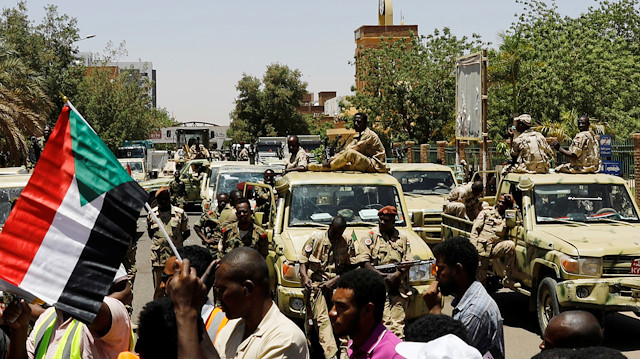
The recent military coup in Sudan was in the interests of Western and some Arab countries that want to control the country's natural resources, experts told Anadolu Agency on Monday.
Boris Dolgov, who serves as a senior researcher in the Institute of Oriental Studies of the Russian Academy of Science noted that the West has long tried to pressure Sudan's President Omar Al-Bashir out of power.
"Sudan is a country extremely rich in natural resources, which attracts the attention of many Western states that do not have or used up their own resources and therefore try to seize control over other countries resources," he said.
Dolgov said the division of the country -- once the largest in Africa -- was part of the same project, the results of which are witnessed today.
"They have already gotten access to the deposits of South Sudan, now it is Sudan’s turn. As the army now has a pro-Western orientation, it is logical to suggest that soon we will read the news that Western companies got preferences for mining activities in Sudan, he said.
Dolgov said al-Bashir himself is a "controversial figure", but that he tried to pursue an "independent policy".
"Bashir was ostracized by the West; he is even wanted by the International Criminal Court. The country was sanctioned many times which resulted in the deterioration of its economy. All this was done with an obvious goal," Dolgov said.
- UAE special services sponsored military coup in Sudan
Director of the international think-tank "Voice of Africa" Engin Ozer told Anadolu Agency that the ouster was conducted against Bashir’s position in a number of issues.
"Sudan has witnessed serious shifts in military cooperation over the last years. President Omar al-Bashir signed a deal with Russia, allowing it military bases in Sudan," said Ozer, adding that al-Bashir had also agreed on the building of a Turkish naval base in Suakin, to "balance interests in the region".
He stressed that Suakin enjoyed a strategic position as a port city on a sea route of particular importance through the Red Sea, over which tankers carry oil from the Persian Gulf. The U.S., France, China, Saudi Arabia have the military bases in Djibouti to protect the route.
"Turkey’s strategic plan was to build a naval base in Suakin. For Turkey, it would be its third military base in the region. One in Doha, a second in Mogadishu, Somalia and a third base in Suakin. If you look at the location of these bases on the map, you can see that they form a 'Turkish' triangle," Ozer said.
He stressed that Turkey's policy in the region is to ensure a balance of powers to provide security.
"Turkey’s main goal is to defend its friends and brothers. But this provoked much discontent in the UAE and Saudi Arabia. There are confirmations that the UAE special services have worked over two years to prepare Sudanese opposition for the protests and demonstrations," he said.
Egypt supported the military coup due to its territorial disputes with Sudan, Ozer added.
"Russia and Turkey worked actively in Sudan, especially in gold mining, which has a special meaning in the fight against Western financial dictatorship in the 21st century. For Russia and Turkey, Sudan was the closest and friendliest country in Africa. Russian-Turkish cooperation in Africa started in Sudan," he said.
Ozer predicted that the new government would be closely involved the West. He also voiced concern that Russia and Turkey may lose their strategic position in the country.
Last year, President Vladimir Putin praised positive developments in Russian-Sudanese relations at a meeting with al-Bashir in Moscow.
Al-Bashir thanked Putin for Russia’s role in bolstering the Sudanese military and opposing the U.K. at the UN Security Council regarding the withdrawal of forces of the UN-African Union Mission in Darfur.
Both Russia’s presidential administration and its Foreign Ministry condemned the military coup after Bashir’s was forced to step down.














